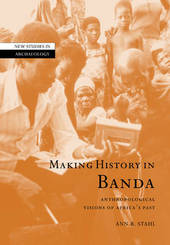
|
Making History in Banda: Anthropological Visions of Africa's Past
Paperback / softback
Main Details
| Title |
Making History in Banda: Anthropological Visions of Africa's Past
|
| Authors and Contributors |
By (author) Ann Brower Stahl
|
| Series | New Studies in Archaeology |
|---|
| Physical Properties |
| Format:Paperback / softback | | Pages:292 | | Dimensions(mm): Height 243,Width 168 |
|
| Category/Genre | African history |
|---|
| ISBN/Barcode |
9780521037976
|
| Classifications | Dewey:966.7 |
|---|
| Audience | | Professional & Vocational | |
|---|
| Illustrations |
23 Maps; 11 Halftones, unspecified; 7 Line drawings, unspecified
|
|
Publishing Details |
| Publisher |
Cambridge University Press
|
| Imprint |
Cambridge University Press
|
| Publication Date |
19 July 2007 |
| Publication Country |
United Kingdom
|
Description
Drawing on evidence from several disciplines, Ann Brower Stahl reconstructs the daily lives of Banda villagers of west central Ghana, from the time that they were drawn into the Niger trade (around AD 1300) until British overrule was established early in the twentieth century. The case study aims to closely integrate perspectives drawn from archaeology, history and anthropology in African studies.
Author Biography
Ann B. Stahl is Professor of Anthropology at the State University of New York at Binghamton.
Reviews'Banda history from AD 1100 to the twentieth century, a time span that includes pre-colonial contact with northern trade routes, the introduction and expansion of European trade, the rise and fall of the Ashanti empire, and the military exploits of Samori. This is a must-read for students of Ghanian history. ... Skilfully tacking back and forth between oral histories, archival sources, and archaeological data, Stahl delineates significant changes in the practices of daily life in Banda's past. Ultimately, the strength of the work lies in its conjoining of disparate lines of evidence to tie global politico-economic forces with local patterns of practices of taste, reproduction and production, and dwelling. ... she keeps her sources in a productive tension and thereby arrives at a richly textured account of the socio-historical processes that shaped and continue to shape the making of the past in Banda.' Journal of the Royal Anthropological Institute
|